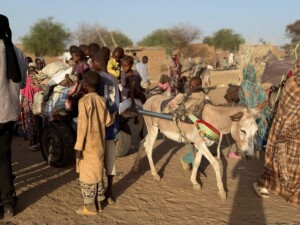Sudanese Pound rallies against major currencies
Positive news of international debt relief, coupled with an increased supply of foreign currency within Sudan, has seen the Sudanese Pound (SDG) rally against major international currencies this month. A Dollar is now worth SDG 451*, up from SDG 400 in the immediate aftermath of the May Paris Conference, where Sudan’s huge debt arrears were cleared, paving the way for the country’s re-entry into the international financial community.
 Sudanese Pounds (SDG) (File photo)
Sudanese Pounds (SDG) (File photo)
Positive news of international debt relief, coupled with an increased supply of foreign currency within Sudan, has seen the Sudanese Pound (SDG) rally against major international currencies this month. A Dollar is now worth SDG 451*, up from SDG 400 in the immediate aftermath of the May Paris Conference, where Sudan’s huge debt arrears were cleared, paving the way for the country’s re-entry into the international financial community.
Initial reports in May showed a hesitant market, however the currency has risen steadily in value on international markets, as well as in Sudan. Commentators suggest that as the Central Bank of Sudan releases more foreign currency onto the market via commercial banks to meet demand, more foreign currency is traded transparently via legal means than via the illegal parallel market.
In February, partly in order to qualify for an IMF debt relief programme which was realised in Paris in May, the transitional government of Prime Minister Abdullah Hamdok took tough measures such as subsidy cuts and introduced a managed currency float, unifying the official and parallel exchange rates, also designed to take the wind out of the sails of unofficial (illegal) forex traders. However the immediate effect on the ground, couple with removal of subsidies, contributed to rising inflation.
Last month, Sudanese authorities arrested 72 people on suspicion of illegal foreign currency speculation. The suspects include bank employees. With the current exchange rates being offered via legitimate channels, parallel market traders in Sudan are concerned as there is less incentive to use them and their turnover has dwindled.
Trading in foreign currency outside of accredited banks and financial institutions is illegal in Sudan, however years of economic malaise means that the practise is still widespread in the country. Before the government devalued the Sudanese Pound to match the parallel market in Febriary, a high proportion of forex trading traditionally occurred via the ‘parallel market’.











 and then
and then